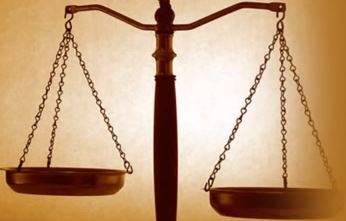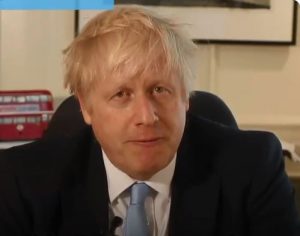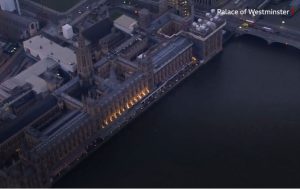
Unic Press UK: In a unanimous decision, a panel of 11 Justices of the UK Supreme Court has ruled that the prorogation or suspension of the UK Parliament by Prime Minister Boris Johnson is unlawful.
The judgment given Tuesday in the case, Appellant (Gina Miller) v Respondent (The Prime Minister), was read by the Supreme Court President, Lady Hale, who led 10 other Justices of the Supreme Court, Lord Reed (Deputy President), Lord Kerr, Lord Wilson, Lord Carnwath, Lord Hodge, Lady Black, Lord Lloyd-Jones, Lady Arden, Lord Kitchin, Lord Sales.
Excerpts from the Supreme Court judgement reads:
“The issue is whether the advice given by the Prime Minister to Her Majesty the Queen on 27th or 28th August 2019 that Parliament should be prorogued from a date between 9th and 12th September until 14th October was lawful. It arises in circumstances which have never arisen before and are unlikely ever to arise again. It is a “one off”. But our law is used to rising to such challenges and supplies us with the legal tools to enable us to reason to a solution.
“Although the United Kingdom does not have a single document entitled “The Constitution”, it nevertheless possesses a Constitution, established over the course of our history by common law, statutes, conventions and practice. Since it has not been codified, it has developed pragmatically, and remains sufficiently flexible to be capable of further development. Nevertheless, it includes numerous principles of law, which are enforceable by the courts in the same way as other legal principles. In giving them effect, the courts have the responsibility of upholding the values and principles of our constitution and making them effective.
“Two fundamental principles of our constitutional law are relevant to the present case. The first is the principle of Parliamentary sovereignty: that laws enacted by the Crown in Parliament are the supreme form of law in our legal system, with which everyone, including the Government, must comply. However, the effect which the courts have given to Parliamentary sovereignty is not confined to recognising the status of the legislation enacted by the Crown in Parliament as our highest form of law. Time and again, in a series of cases since the 17th century, the courts have protected Parliamentary sovereignty from threats posed to it by the use of prerogative powers, and in doing so have demonstrated that prerogative powers are limited by the principle of Parliamentary sovereignty.
“It must therefore follow, as a concomitant of Parliamentary sovereignty, that the power to prorogue cannot be unlimited.
“On the other hand, Parliament does not remain permanently in session, and it is undoubtedly lawful to prorogue Parliament notwithstanding the fact that, so long as it stands prorogued, Parliament cannot enact laws. In modern practice, Parliament is normally prorogued for only a short time. There can be no question of such a prorogation being incompatible with Parliamentary sovereignty: its effect on Parliament’s ability to exercise its legislative powers is relatively minor and uncontroversial. How, then, is the limit upon the power to prorogue to be defined, so as to make it compatible with the principle of Parliamentary sovereignty?
“For the purposes of the present case, therefore, the relevant limit upon the power to prorogue can be expressed in this way: that a decision to prorogue Parliament (or to advise the monarch to prorogue Parliament) will be unlawful if the prorogation has the effect of frustrating or preventing, without reasonable justification, the ability of Parliament to carry out its constitutional functions as a legislature and as the body responsible for the supervision of the executive. In such a situation, the court will intervene if the effect is sufficiently serious to justify such an exceptional course.
“The first question, therefore, is whether the Prime Minister’s action had the effect of frustrating or preventing the constitutional role of Parliament in holding the Government to account. 56. The answer is that of course it did. This was not a normal prorogation in the run-up to a Queen’s Speech. It prevented Parliament from carrying out its constitutional role for five out of a possible eight weeks between the end of the summer recess and exit day on the 31st October. Parliament might have decided to go into recess for the party conferences during some of that period but, given the extraordinary situation in which the United Kingdom finds itself, its members might have thought that parliamentary scrutiny of government activity in the run-up to exit day was more important and declined to do so, or at least they might have curtailed the normal conference season recess because of that. Even if they had agreed to go into recess for the usual three-week period, they would still have been able to perform their function of holding the government to account. Prorogation means that they cannot do that.
“Such an interruption in the process of responsible government might not matter in some circumstances. But the circumstances here were, as already explained, quite exceptional. A fundamental change was due to take place in the Constitution of the United Kingdom on 31st October 2019. Whether or not this is a good thing is not for this or any other court to judge. The people have decided that. But that Parliament, and in particular the House of Commons as the democratically elected representatives of the people, has a right to have a voice in how that change comes about is indisputable.
“It is impossible for us to conclude, on the evidence which has been put before us, that there was any reason – let alone a good reason – to advise Her Majesty to prorogue Parliament for five weeks, from 9th or 12th September until 14th October. We cannot speculate, in the absence of further evidence, upon what such reasons might have been. It follows that the decision was unlawful.”
Reacting to the Supreme Court decision, the Prime Minister Boris Johnson, speaking during an interview that was aired by the BBC said: “Obviously, this is a verdict that we would respect. And we respect the judicial process. I have to say that I strongly disagree with what the Justices have found. I don’t think that it’s right. But we would go ahead.”



